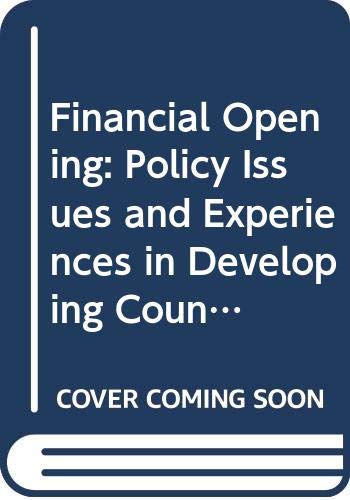Herausgegeben Reisen Helmut Fischer Bernhard (1 results)
Product Type
- All Product Types
- Books (1)
- Magazines & Periodicals
- Comics
- Sheet Music
- Art, Prints & Posters
- Photographs
- Maps
-
Manuscripts &
Paper Collectibles
Condition
- All Conditions
- New
- Used
Binding
- All Bindings
- Hardcover
- Softcover
Collectible Attributes
- First Edition
- Signed
- Dust Jacket
- Seller-Supplied Images
- Not Printed On Demand
Seller Location
Seller Rating
-
Financial Opening. Policy Issues and Experiences in Developing Countries
Published by OECD Organisation for Economic Co-Operation and Development, Paris, 1993
ISBN 10: 9264038620ISBN 13: 9789264038622
Seller: Antiquariat Knacke, Berlin, Germany
Book
Sprache: Deutsch Broschur 4;; 270 Seiten; Bibliotheksstempel auf Rückseite Haupttitel - sonst wohlerhalten; Bibliotheksstempel auf Rückseite Haupttitel; Tabellen, Diagramme, Formeln; Englisch-Französischer Paralleltext - There is rich policy background to this conference volume. The OECD Codes of Liberalisation, which commit OECD Members to financial opening, constitute a policy challenge to advanced developing countries contemplating membership in the OECD. The same group of countries is also facing the challenges of bilateral pressure to open up the financial system and the implications of the current Uruguay Round. Finally, there is a policy conundrum, for financial opening entails the risk of increased financial fragility and overvalued currencies (as demonstrated by countries of Latin America in the late 1970s and early 1980s) and, moreover, the economic performance of some countries with quite restricted financial systems, notably South Korea and Taiwan, has been excellent. Other Asian economies, Singapore, Hong Kong, Malaysia and Indonesia, have also performed very well but with open financial systems. What are the lessons in this for other developing countries? In particular, this book tries to explain why the capital account should be opened, and how and when it should be done. The editors should be commended for having assembled the people who were most likely to provide the right answers to the policy questions outlined above. The conference participants (and authors) include monetary policy makers, financial experts from international organisations, and some prominent academics. Their exchange of views was sometimes controversial, mostly well-founded and always lively when they met at the OECD headquarters on 6 and 7 July 1992. I am confident that the present volume reflects the subtle differences in views on opening the capital account, a complex topic which does not lend itself to simple statements. - - -.


